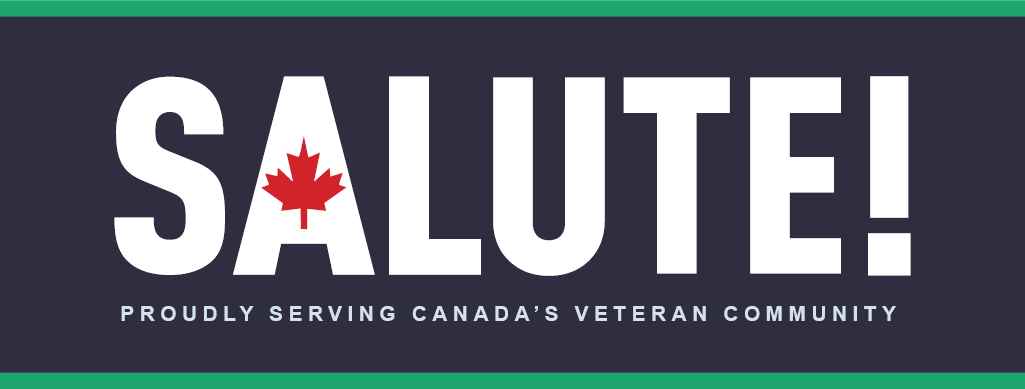In this edition:
- News
- Budget 2024
- Programs and services
- Exploring compassion fatigue: Podcast discussion with Dr. J Don Richardson
- Giving a voice to the Veteran and Family community, one story at a time
- VAC Assistance Service: Free and confidential psychological support
- Mood Disorders Society of Canada improving Veteran wellness through social connection
- Spotlight on women Veterans
- Major Marilou Beaucage: Keeping Canadians Safe
- Veterans' stories
- Dawn McIlmoyle: Finding a purpose in pain
- Commemoration
- Victory in Europe (V-E) Day
- Commemorating the 80th anniversary of D-Day and the Battle of Normandy
- International Day of United Nations Peacekeepers
- Government of Canada delegation participates in the repatriation of an unknown Newfoundland soldier
- Commemoration calendar
- Engagement
- Share your experience: accessing treatment and coverage for service-related conditions
News
Budget 2024
On April 16, the Government of Canada released Budget 2024: Fairness for Every Generation.
Since 2015, the Government of Canada has invested more than $11.5 billion to enhance benefits and services for Veterans. Last year, Veterans Affairs Canada announced $321.1 million, including the $156.7 million investment outlined in Budget 2023, to improve services for Veterans. This funding supported the processing of disability benefit applications by the Bureau of Pensions Advocates and Veterans Review and Appeal Board as well as VAC’s hiring of additional case managers, lowering caseloads for employees, and staff who deliver these services and benefits.
Budget 2024 will build on these efforts and ensure Veterans receive the support, and the recognition they deserve, including by:
Supporting Veterans’ well-being
In 2018, the federal government launched the Veteran and Family Well-being Fund, which provides funding to public, private, and academic organizations, to advance research projects and innovative approaches to deliver services to veterans and their families.
Budget 2024 proposes to provide an additional $6 million over three years, starting in 2024-25, to Veterans Affairs Canada for the Veteran and Family Well-being Fund. A portion of the funding will focus on projects for Indigenous, women, and 2SLGBTQI+ Veterans.
Expanding telemedicine services for Veterans and their families
To ensure Veterans and their families have access to the care they deserve, Budget 2024 proposes $9.3 million over five years, starting in 2024-25, to extend and expand the Veteran Family Telemedicine Service pilot for another three years. This initiative will provide up to two years of telemedicine services to recent Veterans and their families.
Commemorating Canada’s Veterans
To commemorate the contributions and sacrifices of Canadian Veterans, Budget 2024 proposes $3.8 million over five years, starting in 2024-25, to support the Juno Beach Centre in preserving the legacy of the Canadians who served during the Second World War.
Budget 2024 also proposes $4 million in 2024-25 to commemorate significant Canadian military milestones, including the 80th anniversary of D-Day and the Battle of Normandy, and the 60th anniversary of the beginning of the Canadian peacekeeping mission in Cyprus.
Programs and services
Exploring compassion fatigue: Podcast discussion with Dr. J Don Richardson
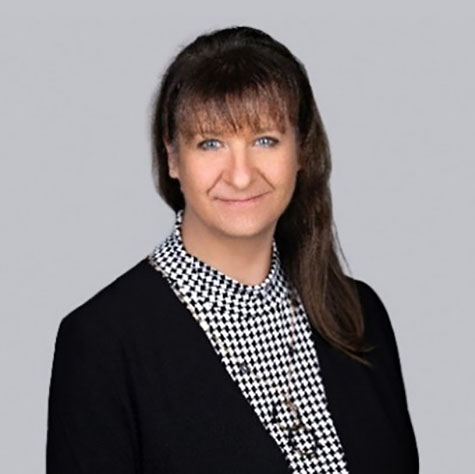
Laryssa Lamrock, Veteran family member, Mind Beyond the Mission podcast cohost
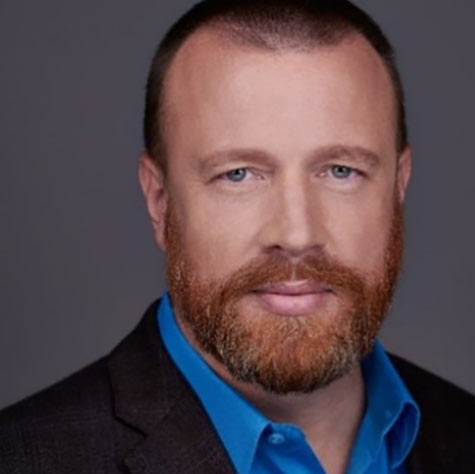
Brian McKenna, CAF Veteran, Mind Beyond the Mission podcast cohost
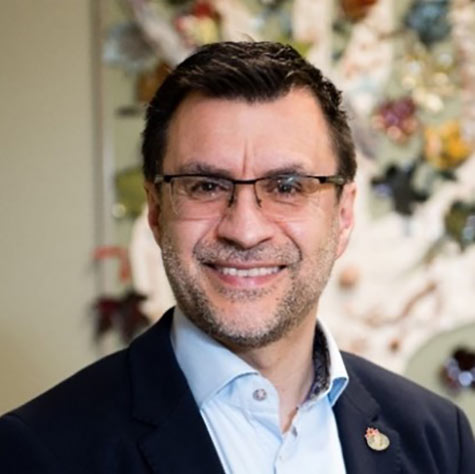
Dr. J Don Richardson, Medical Director of the St. Joseph’s Operational Stress Injury Clinic
Brian McKenna, a Veteran and podcast host, says he knows that family members can suffer from compassion fatigue.
“It’s tricky. It’s like you don’t want to burn out the people that are around you. It seems to me almost like, well, the only other option is stick it back inside, then.”
He and his podcast co-host Laryssa Lamrock are discussing compassion fatigue with Dr. J Don Richardson, Medical Director at the St. Joseph’s Operational Stress Injury Clinic in London, Ontario. Brian offers thoughts from the Veteran’s perspective, Laryssa speaks as a spouse and family member. It is episode 16 of the Mind Beyond the Mission podcast from the Atlas Institute for Veterans and Families: “When am I his wife? Exploring compassion fatigue with Dr. J Don Richardson.”
Veteran family members supporting a loved one with a health concern may sometimes find themselves shifting between a family role to a “caregiver” role several times a day, which can be exhausting. Compassion fatigue can occur quickly, Dr. Richardson says, “because it’s really your over investment in supporting or helping somebody” who has gone through traumatic events. For Laryssa, as a spouse and family member of a Veteran, it was about “giving myself permission to say I’m not doing okay and giving myself permission to put myself first.”
Dr. Richardson, Brian and Laryssa discuss:
- key signs and symptoms of compassion fatigue
- self-care strategies for maintaining your own well-being
- guidance on coping with compassion fatigue, and
- what the recovery journey can look like.
Tune in to episode 16 of the Atlas Institute’s Mind Beyond the Mission podcast on your favourite listening app.
June 26: Save the date - Giving a voice to the Veteran and family community, one story at a time
Take part in an upcoming discussion with the Atlas Institute that presents a new series of videos featuring Veterans and family members. The sessions will explore the healing journey of the storytellers. Their aim is to support those who are walking along the same path.
There are two presentations you can join at no charge, but you will need to register. You can register for both sessions as there will be different presenters and there is no limit to the number of people who can attend. Sessions are in English on Zoom, and French subtitles and captions are available.
Date: Wednesday, 26 June 2024
Times: 3:00 p.m. and 6:00 p.m. Eastern time
Location: The link to participate will be sent to you when you register.
To register: Use the registration button at the bottom of the Atlas Institute web page.
For more information: Visit the event page of the Atlas Institute for Veterans and Families.
VAC Assistance Service: Free and confidential psychological support
The VAC Assistance Service offers bilingual psychological support for you and eligible family members. Our services are voluntary, confidential and free.
Calls are answered by a trained, experienced mental health professional who will identify the caller’s initial needs and make appropriate referrals to professionals located nearby. The VAC Assistance Service will offer an appointment, usually within five working days. In an emergency situation, an appointment is offered within 24 hours.
If the caller is in extreme difficulty or in crisis, the VAC Assistance Service mental health professional will intervene and provide immediate help on the phone before making further referrals.
The VAC Assistance Service ensures client privacy: services offered are handled in the strictest confidence.
For immediate psychological support and referrals, contact us:
- Toll free, 24/7 at 1-800-268-7708 (TTY 1-800-567-5803)
- By live chat service to book a referral, Monday – Friday, 8 a.m. to 7:30 p.m. EST except statutory holidays.
- In Step 1, select “I am a Government of Canada employee, or current or former RCMP / CAF member”
- In Step 2, select in the organization field choose “Veterans Affairs Canada – former RCMP and CAF members”
- Enter password: canada (in lowercase).
You can also access over 1,600 wellness videos, articles and tipsheets with LifeSpeak Mental Health and Resilience (To log in, use Access ID canada in (lowercase), 24 hours a day.
Mood Disorders Society of Canada improving Veteran wellness through social connection
The Mood Disorders Society of Canada (MDSC)’s Improving Veteran Wellness program allows Veterans and their family members to grow social networks and bond with others who have had similar experiences.
Established with the goals of reducing isolation and making a positive impact on the Veteran community, this program has three different options . Participants may choose to participate using any of the options or a combination of these. The options are companionship phone calls, peer support training and receiving mental health ressources. With support from the Veteran and Family Well-being Fund, Improving Veteran Wellness is available across Canada for free for any Veteran or family member over the age of 18.
The program options include companionship calls, peer support training and mental health resources.
Those interested in Veteran-specific mental health resources can fill out a form on the MDSC website to receive a list of resources, tools and educational materials.
This easy-to-access program continues to help Veterans and their families improve their quality of life, social relationships, and mental and physical health. Scroll down the webpage to sign up for these high-quality services. You can also register by email, or by phone at 613-921-5565.
Spotlight on women Veterans
Major Marilou Beaucage: Keeping Canadians safe
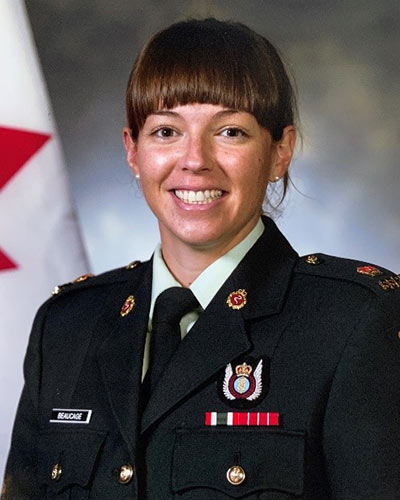
Flight Commander braves fear, uncertainty to evacuate citizens during pandemic
In the bewildering first days of the deadly global COVID-19 pandemic, as most Canadians hunkered down, glued to the news for updates, Canadian Armed Forces flight commander Major Marilou Beaucage flew right into the epicentre.
Beaucage and her team helped evacuate almost 200 Canadians stuck in Wuhan, China in February 2020.
“There were so many unknowns at that time. The Canadian government wanted to get them back to Canada,” Beaucage, an 18-year Veteran and mother of two, remembers.
“It was risky because we knew nothing about COVID-19. All we knew was that people were getting really sick and we had to be prepared to provide urgent care.”
Read Marilou Beaucage’s inspiring story.
Veterans' stories
Dawn McIlmoyle: Finding a purpose in pain
This content involves potentially painful subject matter, including sexual assault. If you are a Veteran, family member or caregiver in need of support, a mental health professional is available 24/7, 365 days a year at no cost to you. Call 1-800-268-7708.
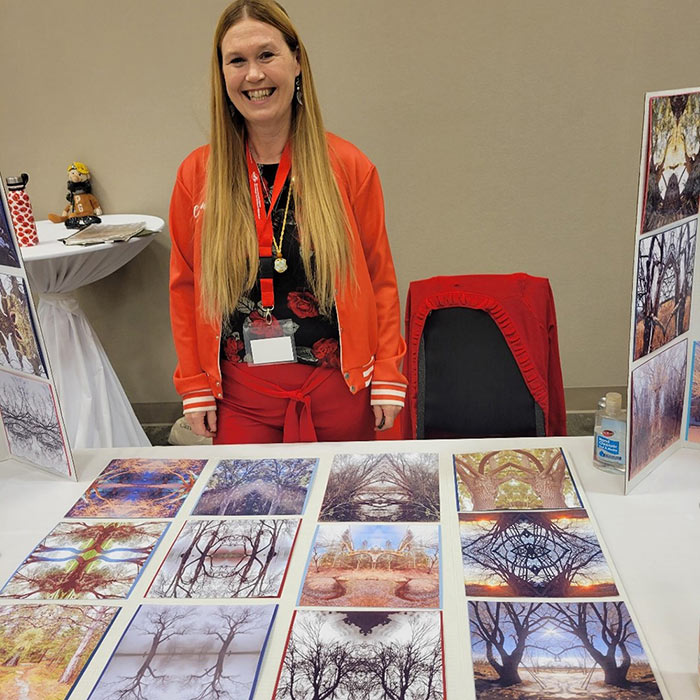
Dawn McIlmoyle sharing her art at an event to connect servicewomen and women Veterans.
Dawn McIlmoyle joined the Canadian Armed Forces in 1991 as a naval communicator. As a new recruit, Dawn excelled in her training and had aspirations of joining the medical field. However, her life changed during her first posting in Esquimalt, BC, when she was brutally sexually assaulted in the barracks after a party. Dawn’s rape was dismissed by the doctor and she was charged for being in the men’s quarters. The experience caused Dawn severe trauma and she was released in 1993.
After her release, Dawn went back to school and wrote about her experience in a creative writing course. That decision eventually led to sharing her story publicly in 1998, when she was on the cover of MacLean’s magazine in an article titled “Rape in the military.” Five years ago, after much personal work, she became more active in the Veteran community and was moved by the women who told her that her cover of MacLean’s inspired them to come forward about their own experiences.
“Finding the light and the grace in it has been the most amazing thing because now I know it didn’t happen to me, it happened for me. So, I can use my pain for purpose, and I can go out there and I can, I do speeches and I talk about how, you know, I’ve overcome all of this.”
Though still batting her own demons, Dawn has been able to discover herself through her pain by seeking connections in a community of brave women and expressing herself through her art and poetry. Dawn continues to advocate for women Veterans and survivors of military sexual trauma and lends her voice to the cause. She is learning how to grow from her trauma every day and now finds meaning in her struggle.
VAC thanks Dawn for her service to her country and community, and her bravery for sharing her story.
Dr. Cyd Courchesne’s Health Tip: Though it is common for people who experience trauma to self-isolate, it is important for Veterans to seek peer support when overcoming mental health barriers. For more information, visit our Peer support web page.
Do you have a story to share about experience in the Canadian Armed Forces? Tell us about it by email.
Commemoration
Victory in Europe (V-E) Day
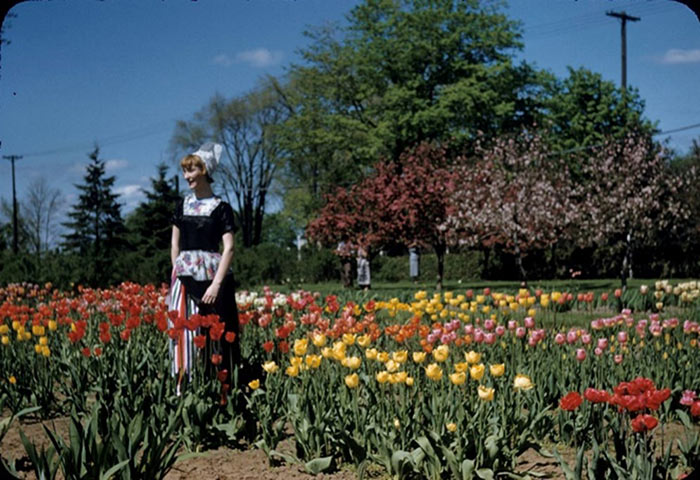
Photo Source: Library Archives Canada, 4316666
The people of western Europe haven’t forgotten what Canadian service members did for them during the Second World War.
In the spring of 1945, Canadian and Allied soldiers went town by town, canal by canal, to free the Dutch people from harsh German occupation. On 5 May 1945, German forces in the Netherlands surrendered.
On May 8, Victory in Europe (V-E) Day, overjoyed citizens in Canada, Europe, and other Allied countries around the world took to the streets to celebrate the end of almost six years of bitter fighting, while remembering what had been lost.
Every year since then, the Netherlands has sent Canada thousands of tulip bulbs as a “thank you” for giving them their freedom, and for helping to bring the Second World War to an end. This beautiful tradition is a reminder of the unbreakable bond between our two countries.
To learn more, visit our Liberation of the Netherlands page.
Commemorating the 80th anniversary of D-Day and the Battle of Normandy

On D-Day, 6 June 1944, some fourteen thousand Canadians stormed Juno Beach alongside Allied forces in Normandy, France. The Allies prepared for and coordinated the attack for several months , making it the largest combined military operation of all time. The operation helped begin the liberation of western Europe.
This spring, Veterans Affairs Canada (VAC) has and will continue to commemorate D-Day and the Battle of Normandy with events across Canada, culminating with our signature ceremonies that will take place on June 6 in Moncton, New Brunswick, and at Juno Beach, in France. We began to commemorate this anniversary with a ceremony at Beechwood National Cemetery earlier this month.
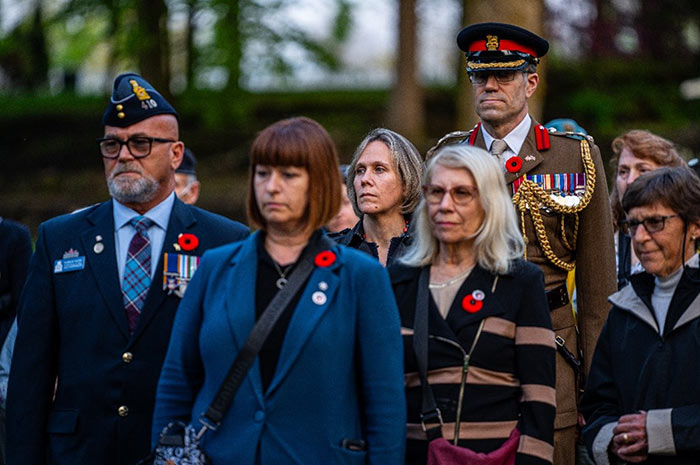
Attendees standing at a commemorative ceremony at Beechwood Cemetery in Ottawa, Ontario.
The Government of Canada has organized delegations of D-Day and Second World War Veterans to travel and participate in these ceremonies in Moncton and Normandy, France, in June. You can follow along with the delegations’ activities on social media, and watch the livestream of the June 6 ceremonies through our Canada Remembers Facebook page.
Lest we forget.
International Day of United Nations Peacekeepers
Every year since 1945, May 29 has been observed as the International Day of United Nations (UN) Peacekeepers. It is a time to recognize the more than 125,000 Canadians who have served in peace operations in dozens of countries, and to honour those who never returned home. The light blue hats and helmets that many peacekeepers wear have come to symbolize security, safety and peace to so many people around the world.
So many remarkable Canadians have committed years of their lives to protecting the peace, like Kelly Willis. After more than 20 years of service with the Royal Canadian Mounted Police (RCMP), she deployed to Mali, a country in western Africa, in 2019. There, Willis participated in the United Nations Multidimensional Integrated Stabilization Mission (MINUSMA).
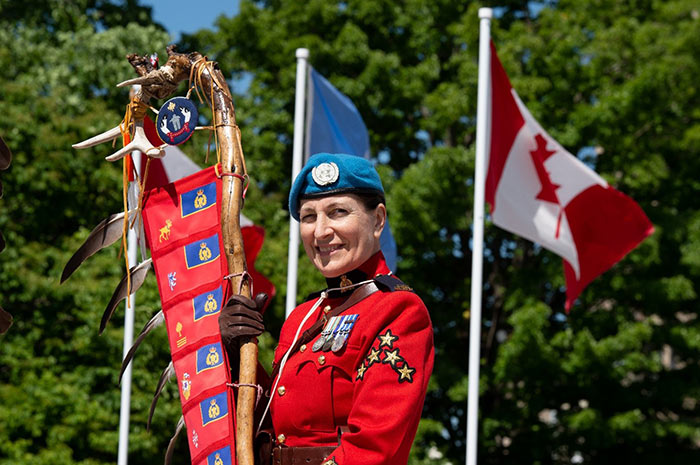
RCMP officer Kelly Willis, the first female officer to deploy to the UN mission to Mali in 2019.
She was one of the first two Canadian police officers — and the first female officer — to deploy to this region. As a proud Cree Nation descendent, Willis shared her story with women at the grand opening of the Police Commissariat in the city of Gao, Mali, in 2019.
Happy International Day of UN Peacekeepers!
Government of Canada delegation participates in the repatriation of an unknown Newfoundland soldier
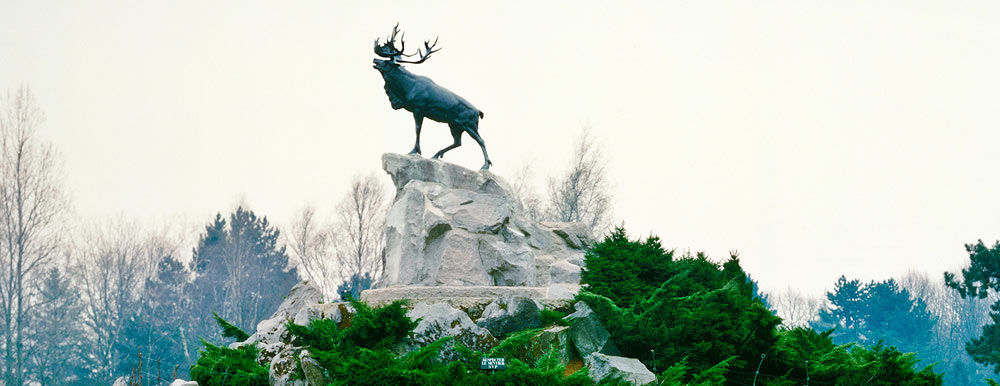
The remains of an unknown Newfoundland soldier will be repatriated from a site in northern France and reinterred in a new tomb in St. John’s, Newfoundland and Labrador. Large bronze caribou monuments at Beaumont-Hamel, in Newfoundland and Labrador and at other sites in Europe honour the service and sacrifice of Newfoundland soldiers.
From May 22 to 25, a Government of Canada delegation took part in a commemorative program honouring all Newfoundlanders who have served in uniform, in particular those who have no known grave. The delegation included Veterans; representatives of Veterans organizations, remembrance institutions, Indigenous groups and the Royal Canadian Mounted Police; and parliamentarians—many of them from Newfoundland and Labrador.
The delegation was led by Minister Seamus O’Regan, on behalf of Minister Ginette Petitpas Taylor, and Parliamentary Secretary to the Minister of Veterans Affairs and Associate Minister of National Defence, Randeep Sarai.
They visited memorial sites for Newfoundlanders and paid their respects where Newfoundlanders who fought and died in the conflict are laid to rest. These sites included four of the six memorials informally known as the Trail of the Caribou. At the Commonwealth War Graves Commission’s Ancre British Cemetery, delegates learned about and honoured Captain Eric Ayre. His brother Bernard, as well as their cousins Wilfrid and Gerald Ayre, all fought during the Battle of the Somme and were killed on 1 July 1916.
On 25 May 2024, a ceremony at the Beaumont-Hamel Newfoundland Memorial in Auchonvillers, France marked a key step in the repatriation of the remains of an unknown Newfoundland First World War soldier to a new tomb in St. John’s, Newfoundland and Labrador.
In recognition of the contribution of service members from Newfoundland and Labrador, the Government of Canada is investing more than $3.5 million over two years to support the Newfoundland and Labrador National War Memorial Centennial project.
Follow the Canada Remembers social media channels and use the hashtags #NLMemorial100 and #CanadaRemembers to join us in activities in Canada and in France. Share your connection to Newfoundland during the First World War and learn more about Newfoundland and Labrador’s unique military history.
For information, visit the Repatriation of an unknown Newfoundland First World War soldier events page.
Commemoration calendar
June
- All of June:
- National Indigenous History Month
- 3 June:
- Canada began participation in UN peacekeeping mission in the Golan Heights, 1974
- 6 June:
- 80th anniversary of the day Canadians came ashore at Juno Beach on D-Day, 1944
- 12 June:
- 25th anniversary of the day CAF members entered Kosovo as part of NATO mission, 1999
- 21 June:
- National Indigenous Peoples Day
- 25 June:
- Korean War began, 1950
July
- 1 July:
- Newfoundland Regiment suffered heavy losses at Beaumont-Hamel, 1916
- 2 July:
- Royal Canadian Air Force (Women’s Division) authorized during Second World War, 1941
- 5 July:
- No. 2 Construction Battalion authorized during First World War, 1916
- 7 July:
- Canada’s combat mission in Kandahar ended in Afghanistan,2011
- 9-10 July:
- 80th anniversary of Canadians helping liberate Caen during Battle of Normandy, 1944
- 26 July:
- Dedication of Canadian National Vimy Memorial in France, 1936
- 27 July:
- Korean War Veterans Day—active fighting in Korean War ended with signing of armistice, 1953
- 31 July:
- The Women’s Royal Canadian Naval Service established during Second World War, 1942
Engagement
Share your experience: accessing treatment and coverage for service-related conditions
Do you use a VAC healthcare card to help you access treatment benefits for your VAC-approved disability? We are asking for Veterans to share their experiences understanding the eligibility requirements for VAC programs and benefits for their service-related disabilities.
This is a follow up to our consultation about health claims processing in 2022. In that consultation, you told us that clear communication about eligibility requirements and treatment options was important to you.
The goal of this consultation is to learn how Veterans understand eligibility requirements and how we can make what is or is not covered more clear.
Visit Let’s Talk Veterans before June 6 to share your experience and feedback. The survey is available in French and English, is brief and easy to complete. We value everyone’s feedback and look forward to hearing from you.
Do you know other Veterans, family members or others who would benefit from the information in this newsletter? Feel free to share it with them.
